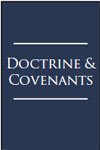The Doctrine and Covenants are a collection of revelations by Joseph Smith and a few others. It is part of the Standard Works.
Changes to the Doctrine and Covenants
Lectures on Faith
Seven Lectures were published as the doctrine portion in the Doctrine and Covenants. The Lectures were part of the LDS canon until they were removed in 1921. The lectures reflect Joseph’s earlier monotheistic views before he evolved into polytheism. Joseph regarded the lectures as doctrine and approved them as canon.

During the month of January, I was engaged in the school of the Elders, and in preparing the lectures on theology for publication in the book of Doctrine and Covenants, which the committee appointed last September were now compiling. | |
 | — Joseph Smith
Mormonism founder
|

A general assembly of the Church of Latter-day Saints was held at Kirtland on the 17th of August, 1835, to take into consideration the labors of a committee appointed by a general assembly of the Church on the 24th of September, 1834, for the purpose of arranging the items of the doctrine of Jesus Christ for the government of the Church. The names of the committee were: Joseph Smith, Jun., Sidney Rigdon, Oliver Cowdery and Frederick G. Williams, who, having finished said book according to the instructions given them, deem it necessary to call a general assembly of the Church to see whether the book be approved or not by the authorities of the Church: that it may, if approved, become a law and a rule of faith and practice to the Church....
| |
 | — Joseph Smith
Mormonism founder
|

The first part of the book will be found to contain a series of Lectures as delivered before a Theological class in this place, and in consequence of their embracing the important doctrine of salvation, we have arranged them into the following work. | |
 | — Joseph Smith
Mormonism founder
|

Now these statements that I now read were in part written by the Prophet and in whole approved by him and taught by him in the school of the prophets. They're taken from the Lectures on Faith... This second in effect is a creed announcing what Deity is. And in my judgment, it’s the most comprehensive, intelligent, inspired utterance that now exists in the English language—that exists in one place defining, interpreting, expounding, announcing, and testifying what kind of a being God is. It was written by the power of the Holy Ghost, by the spirit of inspiration. And it’s in effect eternal scripture; it's true. | |
 | — Bruce R. McConkie
Mormon apostle |
-
Lecture V
Lecture V reflects Joseph Smith’s pre-polytheistic views, which is thought to be the reason why the LDS church removed the lectures from their canon in 1921.

LECTURE FIFTH.
1 In our former lectures we treated of the being, character, perfections and attributes of God. What we mean by perfections, is, the perfections which belong to all the attributes of his nature. We shall, in this lecture speak of the Godhead: we mean the Father, Son and Holy Spirit.
| |
 | — Joseph Smith
Mormonism founder |
Section 2
This revelation that the angel Moroni promised the priesthood is not in any of the earliest editions. It was inserted in 1876 and backdated to 1823.
Section 5
After Joseph Smith claimed to receive a revelation to be a ‘prophet, seer and revelator’, this original revelation was altered to remove the restriction that Joseph’s only gift would be to translate the Book of Mormon.
| Book of Commandments (1833) Chapter IV, v. 2 |
Doctrine and Covenants Section 5:4 |
|---|---|
|
And he has a gift to translate the book, and I have commanded him that he shall pretend to no other gift, for I will grant him no other gift. |
And you have a gift to translate the |
Section 13
This revelation that Joseph received the Aaronic Priesthood is not in any of the earliest editions. It was inserted in 1876 and back dated to May 15, 1829.
Section 20
The original revelation was altered in the 1835 Doctrine and Covenants, and the date was changed to align with the founding of the church in April 1830.
| Book of Commandments (1833) Chapter XXIV |
Doctrine and Covenants Section 20 |
|---|---|
|
The Articles and Covenants of the church of Christ, given in Fayette, New-York, June, 1830. |
The complete revelation, known at the time as the Articles and Covenants, was likely recorded soon after April 6, 1830.
|
Section 27
The original revelation was altered in 1835 to insert language that Joseph had already received the priesthood years prior.
| Book of Commandments (1833) Chapter XXVIII |
Doctrine and Covenants Section 27 |
|---|---|
|
6 Behold this is wisdom in me, wherefore marvel not, for the hour cometh that I will drink of the fruit of the vine with you, on the earth, and with all those whom my Father hath given me out of the world: |
5 Behold, this is wisdom in me; wherefore, marvel not, for the hour cometh that I will drink of the fruit of the vine with you on the earth, and with |
|
7 Wherefore lift up your hearts and rejoice, and gird up your loins and be faithful until I come:— even so. Amen. |
15 Wherefore, lift up your hearts and rejoice, and gird up your loins, and |
Section 48
The original revelation was edited in 1835 to insert ‘the presidency’. An office the Bible and Book of Mormon do not mention.
| Book of Commandments (1833) Chapter LI |
Doctrine and Covenants Section 48 |
|---|---|
|
5 The place is not yet to be revealed, but after your brethren come from the east, there are to be certain men appointed, and to them it shall be given to know the place, or to them it shall be revealed; and they shall be appointed to purchase the lands, and to make a commencement, to lay the foundation of the city;
|
5 The place is not yet to be revealed; but after your brethren come from the east there are to be certain men appointed, and to them it shall be given to know the place, or to them it shall be revealed.
|
Section 101
The doctrine that temple weddings are essential was not publicly taught in the church for at least its first four decades. From 1835 until 1876, Section 101, which prohibited polygamy was part of the canon. It was removed to make room for Section 132, endorsing polygamy.

MARRIAGE
| |
 | — Doctrine and Covenants
(1835 - 1876)
|






